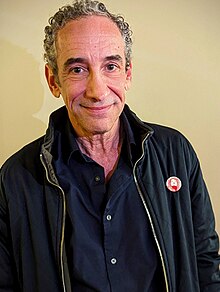
Back دوجلاس روشكوف ARZ داقلاس راشوکف AZB Douglas Rushkoff Catalan Douglas Rushkoff German Douglas Rushkoff Spanish Douglas Rushkoff Basque Douglas Rushkoff French Douglas Rushkoff Polish Рашкофф, Дуглас Russian
Douglas Rushkoff | |
|---|---|
 Douglas Rushkoff at 2023 SXSW | |
| Born | February 18, 1961 New York City, US |
| Occupation | Media theorist, writer, columnist, lecturer, graphic novelist, documentarian |
| Education | Princeton University (BA) California Institute of the Arts (MA) American Film Institute Utrecht University (PhD) |
| Subject | American media |
| Spouse | Barbara Kligman |
| Children | 1 |
| Website | |
| rushkoff | |
Douglas Mark Rushkoff (born February 18, 1961) is an American media theorist, writer, columnist, lecturer, graphic novelist, and documentarian. He is best known for his association with the early cyberpunk culture and his advocacy of open-source solutions to social problems.
Rushkoff is most frequently regarded as a media theorist and is known for coining terms and concepts including viral media (or media virus), digital native, and social currency. [citation needed] He has written ten books on media, technology and culture. He wrote the first syndicated column on cyberculture for The New York Times Syndicate, as well as regular columns for The Guardian of London,[1] Arthur,[2] Discover,[3] and the online magazines Daily Beast,[4] and TheFeature.
Rushkoff is currently Professor of Media Theory and Digital Economics at the City University of New York, Queens College. He has previously lectured at The New School University in Manhattan[5] and the Interactive Telecommunications Program at New York University's Tisch School of the Arts, where he created the Narrative Lab.[6] In 2012, Rushkoff was declared the sixth most influential thinker in the world by MIT Technology Review, following Steven Pinker, David Graeber, Nobel prize-winner Daniel Kahneman, Thilo Sarrazin, and Richard Florida.[7][8]
- ^ Rushkoff, Douglas (2002-07-25). "Signs of the times | Technology". The Guardian. London. Retrieved 2009-07-25.
- ^ Rushkoff, Douglas (2009-03-30). "Crowdsourcing The Bank Recovery". Arthur Magazine. Retrieved 2009-07-25.
- ^ "Science and Technology News, Science Articles". Discover Magazine. 2007-01-21. Retrieved 2009-07-25.
- ^ "Douglas Rushkoff". The Daily Beast. Retrieved 2009-07-25.
- ^ "Media Studies :: Academics :: All Courses". Newschool.edu. Archived from the original on 2011-05-30. Retrieved 2009-07-25.
- ^ "ITP Research 2005 » Narrative Lab". Interactive Telecommunications Program. Archived from the original on 2012-07-12. Retrieved 2009-07-25.
- ^ Emerging Technology from the arXiv. "World's Most Influential Thinkers Revealed". MIT Technology Review. Retrieved 2 April 2023.
- ^ Frick, Karin; Guertler, Detlef; Gloor, Peter A. (2013). "Coolhunting for the World's Thought Leaders". arXiv:1308.1160 [cs.SI].